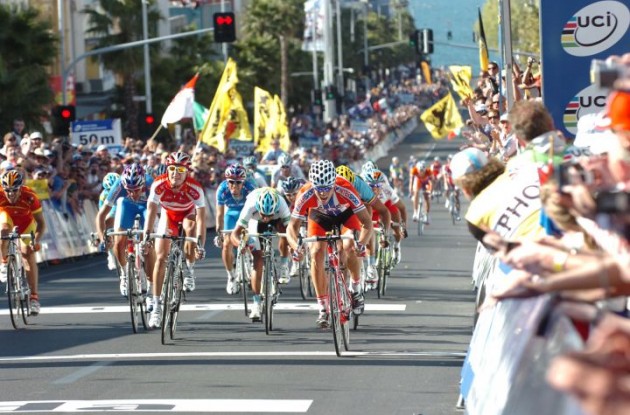2011 Elite Men's World Road Race Championship Preview
Tomorrow's elite men's world road race championship shows the signs of being a classic, no pun intended.
Tomorrow's elite men's world road race championship shows the signs of being a classic, no pun intended. The 266-km race course in Copenhagen, Denmark is largely flat, but it has climbs, including one at the finish. In addition, Denmark is a windy country, and the possibility of the field splitting into echelons cannot be ruled out. Many observers have said that the race will end in a bunch sprint, but others, including the great Sean Kelly and sprinter Peter Sagan (Slovakia), believe that many breaks will occur and that the race could be won from a small sprint.
The race will begin with a 28-km run from the Copenhagen City Hall Square to Rudersdal, a suburb of the Danish capital. There, the riders will climb onto the circuit on which they will spend the rest of the race. Much of each lap is hilly, with the riders going up and down. Most of the second half of each circuit is rolling but reasonably flat until the end, where the riders must tackle a sharp climb. The final ascent will decide the ride, but how many riders will be in a position to contest it?
A likely scenario is as follows. Teams with riders who can win from breaks such as Norway (Edvald Boasson Hagen and defending champion Thor Hushovd), Switzerland (Fabian Cancellara), and Belgium (Philippe Gilbert) will initiate breaks. Teams with bunch sprinters such as Italy (Daniele Bennati), Spain (three-time world road race champion Oscar Freire), Germany (Andre Greipel), and Great Britain (Mark Cavendish) will chase the breaks. A team that has riders who can win in small sprints or big ones such as Australia (2011 Milan-San Remo winner Matthew Goss, Simon Gerrans, and possibly Stuart O'Grady) might place a rider in the breaks to mark them. At some point during the last lap, the elastic will break, and the final selection will occur. That selection might contain four riders or forty, but no one who is not in that group will medal. Who is likely to win? Who is likely to medal?
The gold medal will go to either Hushovd or Gilbert. Each man has demonstrated that he is fit and ready to win in Copenhagen. Moreover, the course suits those riders' abilities and style of racing. Gilbert won the 2011 Amstel Gold Race with an attack on the Cauberg, and Hushovd took Stage 13 of this year's Tour de France from a breakaway. Each has shown that he is ready for tomorrow's race--Gilbert with a victory in the Grand Prix Cycliste de Quebec and Hushovd with a stage win in the Tour of Britain. One will have gold, and the other will have silver.
The battle for the bronze is an open one. If Goss makes the final selection, he has a chance. So does Gerrans. And let's not forget O'Grady, who surged away from the field to win the 2007 Paris-Roubaix. Freire has taken bunch sprints and small ones, but his health is an issue. If Cavendish's team can get him up the final climb, the Manxman has a shot. And a breakaway specialist such as Sylvain Chavanel (France) can always surprise. Any one-day race is a lottery, but these are the men who are likely to win the smaller payouts, while Hushovd and Gilbert get the bigger ones.
Check in at www.roadcycling.com to read news on the men's elite world road race championship and watch video highlights from the 2011 UCI cycling world championships in our video section!








